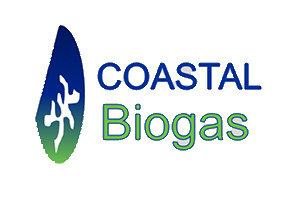
The COASTAL Biogas project objective is to provide solutions based on anaerobic digestion of cast seaweed to coastal regions to tackle eutrophication, contribute to the transition to a circular bio-economy and improve prosperity.
Approach
By digesting cast seaweed and use the digestate to replace fossil based artificial fertilizers nutrients are physically removed from the Baltic Sea and hence the nutrients loop is closed which is fundamental for the circular bioeconomy. In addition the inconveniences with rotten seaweed (smell, flies etc) are eliminated and low quality resources/wastes are transferred into a renewable high quality fuel that can be used for local electricity and heat supply, as transport fuel or for injection into the natural gas grid.
Activities
COASTAL Biogas is composed of 5 work packages, of which WP1 deals with Management and Coordination and WP2 deals with Communication and Dissemination.
WP3 Potential, benefits and good practice deals with the potential of cast seaweed and provides methods to assess the associated potential eco system benefits in the South Baltic Sea region. Here, ongoing or recently finished biogas projects and facilities related to anaerobic digestion (AD) of maritime substrates and digestate utilization as well as policy framework will be reviewed.
WP4 Exploration & Implementation deals with increasing the environmental service contribution from biogas production in the South Baltic Sea area by improving the utilization of seaweed in biogas processes and the residual fermented biomass (digestate) as fertilizer. It has the following sub-objectives:
- Exploration and first step implementation of new collection techniques related to biogas production in the South Baltic Sea area.
- Primary energy recovery through laboratory, pilot and feed in industrial scale testing of new pre-treatment technologies to utilize seaweed in anaerobic digestion.
- Secondary energy recovery from contaminated digestate by thermochemical conversion.
WP5 Feasibility studies, supporting opportunities and multiplying project results deals with the development and testing of tools and assessment methods to assist in planning and decision making. The analysis results will uncover strengths, weaknesses, problems and possible solutions of the objective technology. Planning instruments will be designed to accelerate and facilitate decision making by gathering all data upon which decision can be made in one place and providing models and simulations to evaluate investment potential, predict the success of the investment and determine the development strategy. The knowledge and assessment tools will be spread to interested professionals as well as perform lectures on biogas/seaweed solutions and provide detailed information to stakeholders on the market, technical, economic and social determinants in implementation and exploitation of nutrient removal technology.
The project has received funding from the European Regional Development Fund through the South Baltic Sea Programme.

LEI activities in the project
Total budget: 1 575 378,47 EUR
Coordinator: Agency for Renewable Resources (Fachagentur Nachwachsende Rohstoffe), Germany
Partners:
- Gdansk University of Technology, Poland
- Baltic Energy Innovation Centre, Sweden
- Roskilde University, Denmark
- University of Rostock, Germany
- Lithuanian Energy Institute, Lithuania
Project Team
| Name, surname | Office | phone. | |
|---|---|---|---|
|
LEI Representative |
|||
| Andrius Tamošiūnas | 204-AK | +37037401999 | Andrius.Tamosiunas@lei.lt |
|
Project Team |
|||
| Airingas Šuopys | |||
| Diana Meilutytė-Lukauskienė | 418-AK | +37037401981 | Diana.Meilutyte-Lukauskiene@lei.lt |
| Nerijus Striūgas | 103-LK | +37037401877 | Nerijus.Striugas@lei.lt |
| Vilma Snapkauskienė | 113-LK | +37037401898 | Vilma.Snapkauskiene@lei.lt |
| Dovilė Gimžauskaitė | 110-LK | +37037401866 | Dovile.Gimzauskaite@lei.lt |
| Liutauras Marcinauskas | 116-LK | +37037401900 | Liutauras.Marcinauskas@lei.lt |
| Diana Šarauskienė | 425-AK | +37037401969 | Diana.Sarauskiene@lei.lt |
| Aldona Jurgelėnaitė | 416-AK | +37037401964 | Aldona.Jurgelenaite@lei.lt |
| Vytautas Akstinas | 426-AK | +37037401962 | Vytautas.Akstinas@lei.lt |
| Svetlana Petraitienė | 218-AK | +37037401815 | Svetlana.Petraitiene@lei.lt |





